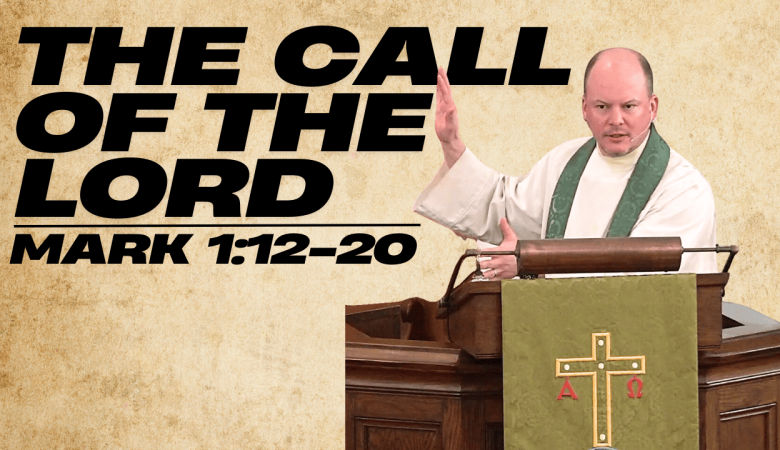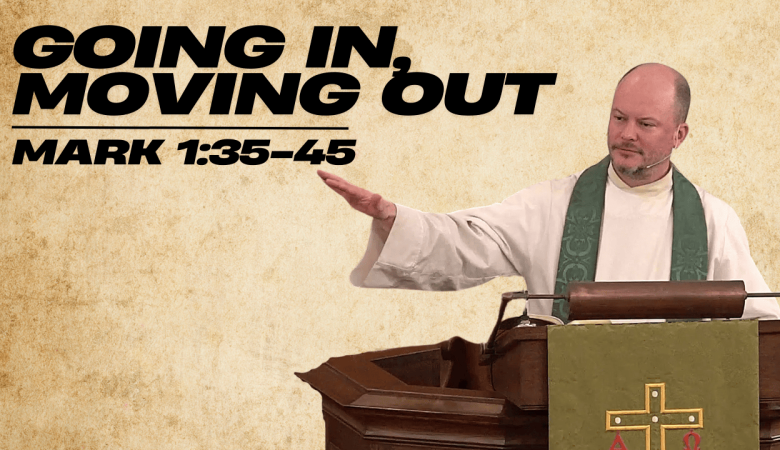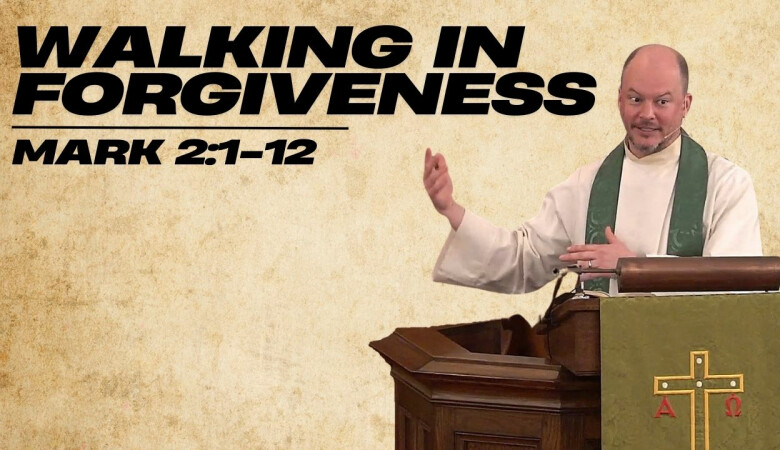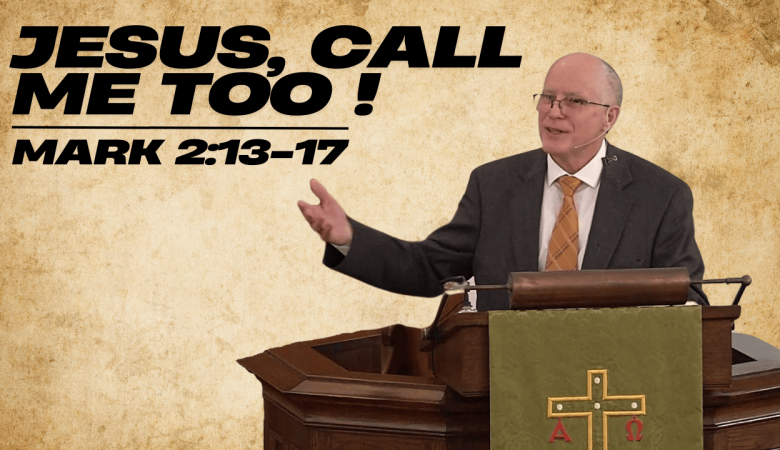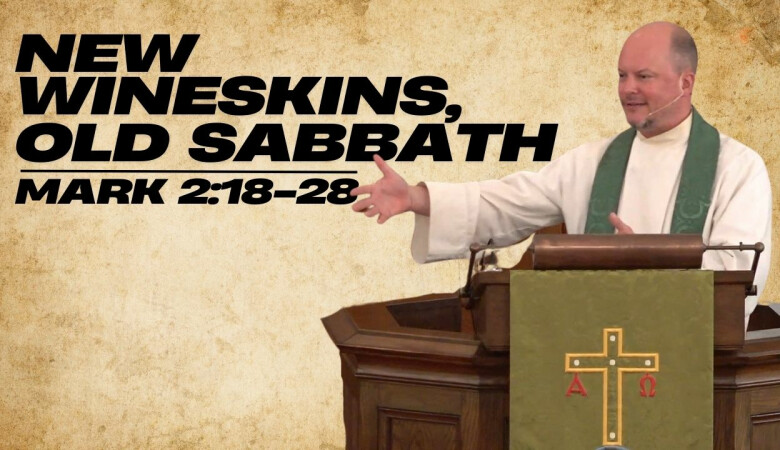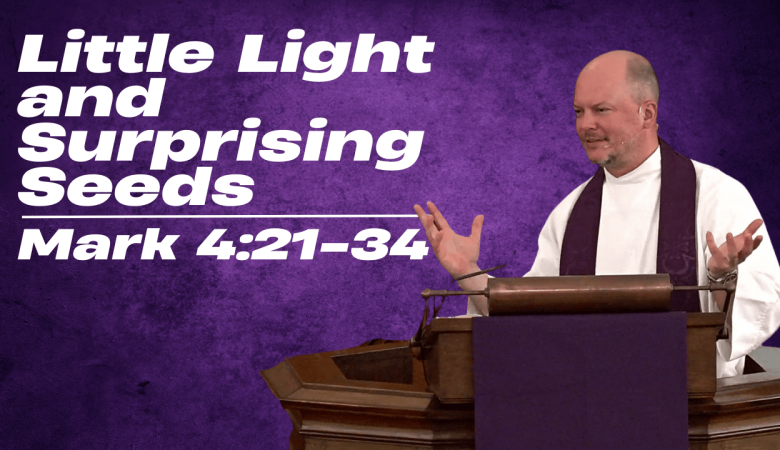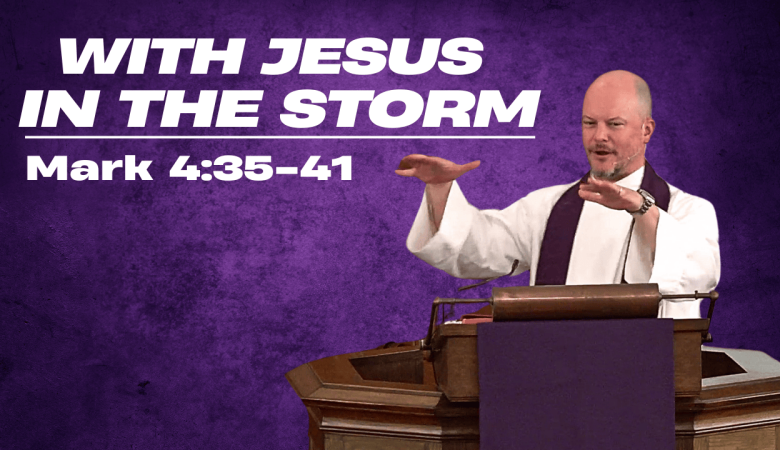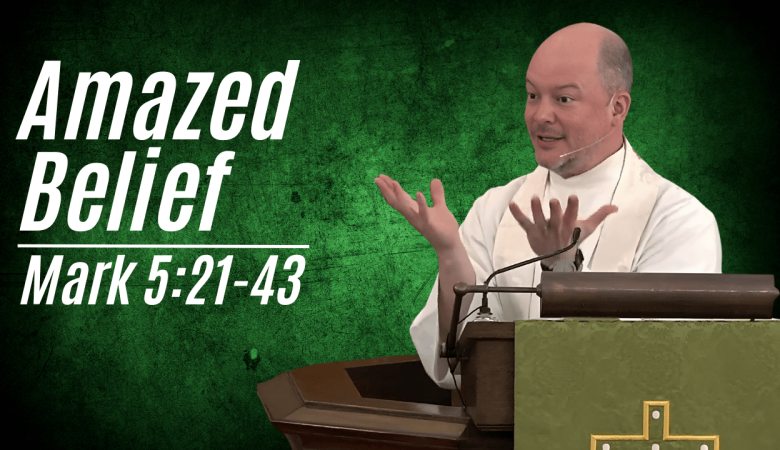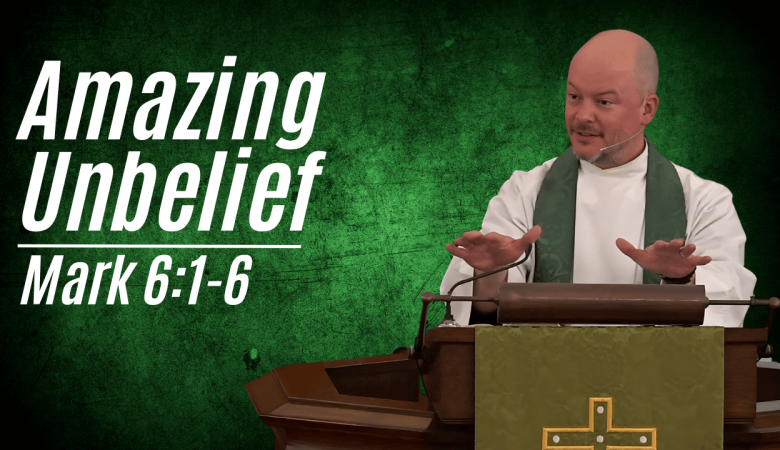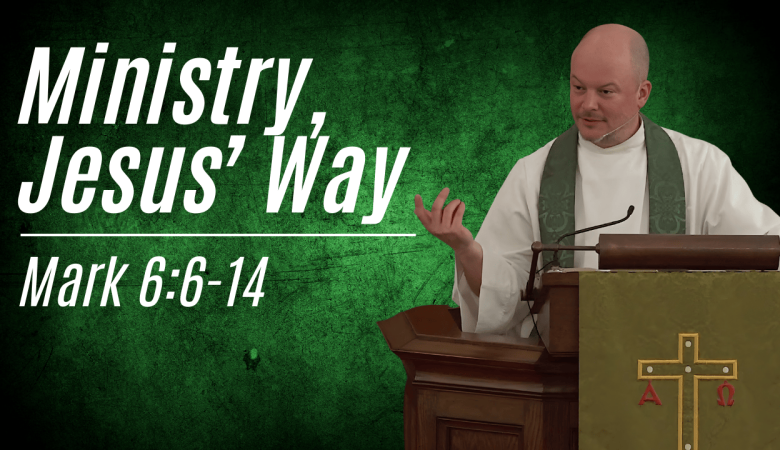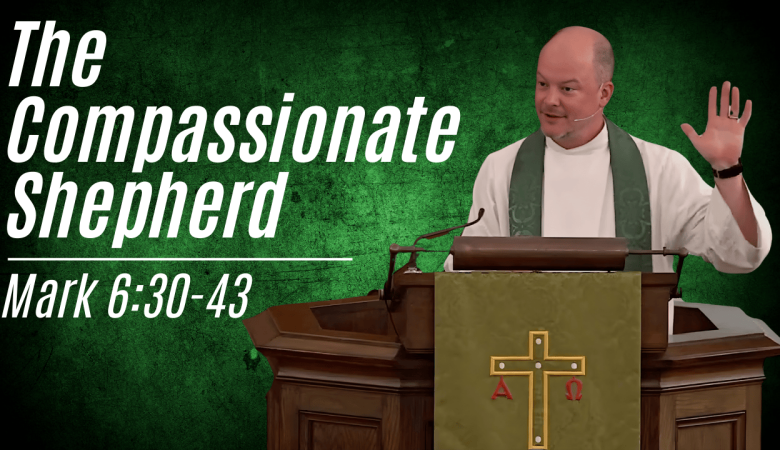Series: The Gospel of Mark
Authoritative Teaching, Authoritative Action
January 26, 2025 | Peter Rowan
Passage: Mark 1:21-34
Summary
Jesus is a great moral teacher. He was received as such right from the beginning of his ministry and he has been ever since. And yet, while that is true, it is woefully not enough. Mark tells us a couple times how people were astonished at Jesus teaching but in-between those he heals a man with an unclean spirit. He isn't just a great teacher, he is the one who has power over Satan, sin and death. So what do we do with Jesus? is he a liar, a lunatic, a legend or the Lord of all?
Transcript
I mentioned C. S Lewis the last two weeks and so in keeping with that trend (I don’t know at what point something moves from a trend to a tradition, but I’m thinking it’s still a trend), I want to share with you how he began a memorial lecture he gave at King’s College in London in 1944. This was given to a group of soon to graduate college students and it became his famous essay “The Inner Ring” it teaches an incredibly important lesson. He begins with a few lines from Tolstoy’s War and Peace.
When Boris entered the room, Prince Andrey was listening to an old general, wearing his decorations, who was reporting something to Prince Andrey, with an expression of soldierly servility on his purple face. “Alright. Please wait!” he said to the general, speaking in Russian with the French accent which he used when he spoke with contempt. The moment he noticed Boris he stopped listening to the general who trotted imploringly after him and begged to be heard, while Prince Andrey turned to Boris with a cheerful smile and a nod of the head. Boris now clearly understood—what he had already guessed—that side by side with the system of discipline and subordination which were laid down in the Army Regulations, there existed a different and more real system—the system which compelled a tightly laced general with a purple face to wait respectfully for his turn while a mere captain like Prince Andrey chatted with a mere second lieutenant like Boris. Boris decided at once that he would be guided not by the official system but by this other unwritten system.
Lewis goes on to say this:
“When you invite a middle-aged moralist to address you, I suppose I must conclude, however unlikely the conclusion seems, that you have a taste for middle-aged moralizing. I shall do my best to gratify it. I shall in fact give you advice about the world in which you are going to live.”
And advice, and good and important advice he does give. He speaks about this inner ring, being in, with in crowd. The Boris and Andrey kind of in. The impulse, the driving desire that we find all over the place - on our sports teams, at college, in the halls of our capital building, in theater classes, in our neighborhood - all over the place - this driving impulse to be part of an inner circle of those who get it, those who are “in”. And there are all kinds of good lessons for us as individuals and us as a church, regarding this warning of how we seek to be “in”. He says, rather starkly, “Of all the passions, the passion for the Inner Ring is most skillful in making a man who is not yet a very bad man do very bad things.”
Anyway, a good middle-aged moralizer. That’s what Lewis was that day. He fulfilled his role and I’m glad he did. I have read that essay many times over again.
But here’s the thing. Many many people come to Jesus like those students came to Lewis give that memorial address at King’s College London that day. They come, the dutifully sit, they give their ear to him and the learn because, they say, “He’s a good teacher”.
I listened to a podcast this week of someone discussing Jesus. This man isn't a Christian but he finds the teachings of Jesus very interesting. He would even say the most interesting. “Jesus is an amazing human being”, he said. And he went further to say that the “Christ consciousness” is maybe what is most needed in the world. “We don’t need Jesus”, he said, “we need the Christ consciousness in us.”
I want to say two things about this approach to Jesus as a great teacher that is so so common. I want to say first that there is a lot that is right here.
A Lot Right.
You know, people are endlessly interested in Jesus. You can find magazine covers throughout the year near the checkout line with some front page article on Jesus. Of course they seem to pop up the most around Christmas and Easter, but the fascination with Jesus seems perennial.
And that is a remarkable thing. After all, there are many titles that historians of the future may give our era, the time that we live in, but one that they are certain to consider is "The Age of Suspicion” or the “Age of Skepticism”. People are suspicious of political authorities because they have lied so often (think just recently of Biden vowing he wouldn’t pardon his son, then he goes ahead and pardon’s most of his family or of Trump and his “law and order” only to pardon all of the folk that breached the capital four years ago this month - what kind of political skepticism does that breed?). People are suspicious of economic authorities because financial markets have collapsed (stings being pulled and rates going up and down and all around). People are suspicious of religious authorities and rightly so - so often the church has not been swift top address abuse in the church. Pastors have notoriously abused their their role to the harm of countless people. People are suspicious of technological authorities because the products resulting from their discoveries have in many cases devastated the environment. People are suspicious of scientific authorities. (I’m always amazed how anyone would consider taking some medicines after the long list of possible side effects at the end of commercials.)
People are suspicious, particularly of authorities and authorities that are prone to tell them what to do!
Lewis understood that addressing a bunch of college students with middle-aged moralizing was not exactly going to be received well, no matter how important the advice he had to give was.
But, even with this skeptic world that we live in, nearly everyone you talk to would say that Jesus is a good teacher. And there is something really right in that.
So our text says that they (Jesus and his disciples, went to Capernaum (which is on the northernmost part of the Sea of Galilee) and they go the synagogue on the Sabbath (which we are told elsewhere was Jesus’ custom - and if it is his custom, it should be ours if you follow him). Anyway, the next thing we hear is that he was teaching and the people he was teaching were astonished at his teaching because he taught with authority. Very interestingly, this exact idea is repeated for us at the end of this first paragraph.
So, we have teaching and we have people being astonished at his teaching with authority in verse 21 and 22, but then we have this idea of people being astonished not just with his teaching but with his authoritative teaching in verse 27 also.
So these people were astonished at Jesus’ teaching just like people are today. And they are astonished because he taught as one with authority. You see that would have been a great deal different than what they were used to. In the context of the synagogue they would have been very accustomed to teaching, but it was teaching that was always grounded in another’s authority. The primary emphasis in that world was on tradition - what does the tradition say? So the teacher would often just provide lengthy quotes about what some other rabbi taught. Our text, at the end of v 22 says that his authority was a not like the Scribes. Well, the scribes would have been experts in the law of God, but they would have largely quoted it. They weren’t the authority, it was. Here Jesus is. There is a qualitative difference here in Jesus teaching and it is the fact that he is authoritative.
So, we come to Jesus today and we are still astonished at his teaching. He says “When you give, don’t be like the hypocrites and when you pray don’t be like the hypocrites and you fast don’t be like the hypocrites.” And why, because they are really just doing it for attention. And we all say, yes, amen. If you do those things for attention, you miss the whole point. Or we come to Jesus teaching on lust and we hear him say that if we have looked at a woman lustfully then we have committed adultery and even if we don’t want to admit it we know that he is right. That lustful look was an unfaithful act. His teaches with authority and so many in the world look to him for instruction. I mean, Muslims are wise in a way to revere him as a prophet.
Ok, my first point here is that there is a lot that is right in coming to Jesus as a good teacher. He is that. The world at large acknowledges that and so should you.
But while that is right, if that is all, then it is woefully wrong.
Woefully wrong
So, our text is formed as an inclusio, a literary envelope. People being astonished at his authoritative teaching at the beginning and at the end of the paragraph. But in the middle we have this exorcism. We have a demonic confrontation.
And I think this demonic confrontation is Mark’s way of telling us that we can’t just have Jesus as a good moral teacher.
So this man with a unclean spirit (by the way, that uncleanliness would mean that he is unwelcome in the synagogue and Jesus liberates him and in doing so welcomes him into the worshipping community), anyway, this man with an unclean spirit comes up and says “What do you have to do with us? (or a better translation might be “what between you and me?” And then he names Jesus twice - Jesus of Nazareth and Holy One of God. He names him the god-man. But remember naming in the Bible was an authoritative act. This was as though demonic forces are telling Jesus they are still the authority here. It is a power move.
You can teach, but I’m still in charge. You have your place, I have mine. What’s between you and me.
And Jesus rebukes him. “Be silent. Come out.”
Right between this authoritative teaching is this account where someone is saying I still have authority over you. I still determine what is right.
And the fact is that most of us approach Jesus this way. Sure, good teacher, not Lord. Sure, I’ll take what I want from his teachings, but I don’t want to fall down and worship him as truly God. Sure, good morals that can be helpful for life, but I still want to be the king in my life.
And Mark is saying we can’t have it that way. You can’t have it that way. Jesus cannot be only a a good moral teacher, not as he is presented for us in the gospels. Sure, he gives good teaching, but he also talks to demons and forgives sins and all kinds of other things that would be considered crazy if they aren’t true.
I think this is why in the next section here in Mark 1, Mark includes for us the healing of Peter’s mother-in-law. Remember, Mark is telling us Peter’s memoirs, so it is particularly interesting that we have this detail from Peter’s own house. But what happens is that Jesus comes and takes here baby the hand and lifts here up. And that word there that is translated “lifted her up”, “egeiro” is the word Mark uses when Jesus speaks of his resurrection in Mark 14 and when the young man reports that Jesus has risen in chapter 16.
What I’m saying is that Mark is telling us there is no one like Jesus and you cannot just take him as a good moral teacher, so middle-aged moralizer. You cannot do that.
Interestingly, Mark goes on to tell us that that evening they brought to him all who were sick and oppressed by demons. And that the whole city was gathered together at the door. It is this universal, all-encompassing invitation.
And that’s what it is for us today.
Do you take Jesus as a good teacher? Great. You should. He was and he is. But does it end there? Will you come to him with your pain, with your sorrow, with all that needs healing. With the fight against Satan, sin and death and allow him to be your Lord and your Savior?
The Scottish pastor and preacher, “Rabbi” John Duncan wrote this in 1860: Christ either [1] deceived mankind by conscious fraud, or [2] He was Himself deluded and self-deceived, or [3] He was Divine. There is no getting out of this trilemma. It is inexorable.
You may know that C. S. Lewis made this argument for Jesus as divine more popular in his book Mere Christianity. He wrote this:
I am trying here to prevent anyone saying the really foolish thing that people often say about Him: I’m ready to accept Jesus as a great moral teacher, but I don’t accept his claim to be God. That is the one thing we must not say. A man who was merely a man and said the sort of things Jesus said would not be a great moral teacher. He would either be a lunatic—on the level with the man who says he is a poached egg—or else he would be the Devil of Hell. You must make your choice. Either this man was, and is, the Son of God, or else a madman or something worse. You can shut him up for a fool, you can spit at him and kill him as a demon or you can fall at his feet and call him Lord and God, but let us not come with any patronising nonsense about his being a great human teacher. He has not left that open to us. He did not intend to. . . . Now it seems to me obvious that He was neither a lunatic nor a fiend: and consequently, however strange or terrifying or unlikely it may seem, I have to accept the view that He was and is God. (Mere Christianity, 55-56)
I know, some of you will be familiar with this argument and maybe you know that isn’t entirely sound because there is another option and that is that all of this stuff in Matthew and Luke and John Mark here is just a legend.
But think of the details here in this story today. They are at a Jewish synagogue, they are Peter’s very house. These are all Jews. They are all people that confessed day and night that there is just one God and there cannot possibly be another. It’s very odd that a legend like this would come from these people of all people who confessed one God and even from this Jew Peter who did not necessarily believe easily in Jesus death and resurrection.
No, you must make the decision. This isn’t presented to us as legend. And he cannot just be a good moral teacher. Is He the Lord?
|
|
|
Series Information

Mark's gospel is fast. He jumps right into what is central to the good news, the gospel, of Jesus. John the Baptist comes, and he is great, but his whole message is one of preparation for the greater one who would come after, Jesus. And everything John says has to do with this comparison of just how great Jesus is. We also see this through the writer of the gospel, Mark, and the apostle who was behind Mark's writing, Peter. Then we quickly move to Jesus' baptism by John and we see here the other central idea of the gospel, that this great one who has come humbles himself to associate and own the sins of humanity. Here is good news!


